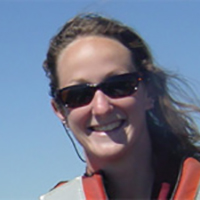A global network of robotic floats that measure the changing state of the ocean.
Oceans and Atmosphere
Physical Oceanography
Physical Oceanography is the field of study that deals with mechanisms of energy transfer through the sea and across its boundaries, and with the physical interactions of the sea with its surroundings, especially including the influence of the seas on the climate of the atmosphere. Students admitted to Climate-Ocean-Atmosphere Program (COAP) can choose the physical oceanography curricular group.
Academics
Centers, Labs, and Programs
CalCOFI is a long-term, interdisciplinary, cross-sectoral ecosystem research program off the coast of California that holistically studies the physics, biogeochemistry, and biology of the marine environment to inform the sustainable management of marine resources in the context of climate change
One of Scripps's longest-running data centers, serving reference-quality hydrographic ocean data to an international community for over 20 years
Our lab observes the ocean environment with three main projects: the Shore Stations Program, the SCCOOS Automated Shore Stations Project and the California Harmful Algal Bloom Monitoring Program (CalHABMAP).
The group focuses on observing and modeling coastal processes including beach evolution, cliff erosion, and nearshore waves.
Develops and implements coastal observatories, serves as a science and technical interface with local, state, and federal agencies, and manages various system components.
Specializing in estuarine and coastal processes with an interest in interdisciplinary projects that address how physics impacts important biological and chemical processes in the coastal environment.
The Global Ocean Biogeochemical float program supports robotic ocean-monitoring float profiles around the globe that are used by scientists and educators to better understand ocean health.
Our mission is to pursue scientific studies in underwater acoustics, small-scale physical oceanography (coastal processes, air-sea gas transfer) and biological oceanography.
Develops autonomous instrument platforms and sensors for them, builds instrumented vehicles, and operates floats and gliders for such projects.
A specialized team of oceanographers, engineers, and graduate students solving vexing problems in ocean physics and biology. We develop, build, and deploy novel scientific instrumentation to observe the ocean in new ways.
Ecological data collected on Scripps Institution of Oceanography research pier.
Upper ocean temperature profiles
Collects and provides access to current and historical data records of sea surface temperature (SST) and salinity (SSS) measurements observed at shoreline stations along the coast of California.
Our research resides at a synergetic overlap between geophysical fluid dynamics, physical oceanography and climate dynamics. We are particularly interested in ocean mesoscale and submesoscale dynamics, air-sea interactions and sea-ice interactions.
An autonomous long range platform to unveil the oceans.
The U.S. Global Ocean Ship-based Hydrographic Investigations Program is part of an international network of hydrographic research cruises repeating measurements on a decadal time scale


































